So, as threatened, another rambling note post before Quiz 2.
10/17
Calasso, chap 7. Kore (Persephone) and Demeter. 4 or 5 seeds. Elusinian mysteries (religion about which you can say nothing). Dress in sheet, led to temple, High Priest does something, says something, shows something, initiate is transformed. Mustes(keep mouth shut). Kore can also mean pupil. So Kore is about to pick a flower, and picked herself, pupil seeing the act of seeing.
10/21
Heaven (space as home, time as now; real present) Paradise (Exuberance, dance, energy) Earth (linear and cyclical) Hell (demonic repetition). Parallel with Viggo: Gods, Heroes, Men, Chaos. Frye: Kerygmatic, ideological, conceptual, descriptive.
According to Black Elk, the center of the world is wherever you happen to be at the time.
Read Eliot's Four Quartets for heavenly time.
10/24
Mt Mariah, Mt. Siai, Mt Cook (Arokorai), Mt Olympus, Chief Mountain, Mt Harney.
Axis Mundi: center of the world. universal concepts of ascent and descent.
Tragedy is literature about people who are better than you, Comedy is literature about people who are worse than you.
Drama from Dromenon (thing that is done): ritual
Tragedy: Song of the goat
3 tragedians: Aeschylus (how to get out of the endless cycle of blood debt and revenge), Sophocles, Euripides.
Clytemnesta exhibits hubris: arrogance to the Gods.
10/26
Aristotle defines tragedy as the imitation of an action that is serious, complete, and of a certain magnitude. For us, its about the question How do we deal with suffering? What kinds of answers to the questions of suffering are given to us?
Theodicy: God making people suffer who don't deserve to.
Suffering is the lot of human beings.
Buddha says all is suffering and all is fleeting.
Dionysus's function is to trive them out of their minds. Everything is liquid, everything is fleeting.
Icarius dancing around the goat is the beginning of tragedy. (tragodea: song of the goat) Danced on a wineskin.
The furies' eyes ooze goo. Chthonic (of or pertaining to the underworld) agents of retribution. Furies avenge blood crimes. The only stories worth telling are family stories.
Chthonic laws of retribution are deeply maternal.
Senator comes from senex: old, impotent man.
10/28
Clytemnestra is cunning and devious.
Epiphany is a manifestation of power from another dimension to give a different view. Moses had an epiphany at the burning bush.
Lex Lutho was superman's nemesis. The furies were involved whenever there was blood murder. Therapist: the-rapist. Pay attention to metaphors like net, yoke, chain, and harness.
Apollo wanted Cassandra, she said cool but you have to make me like Cleo first. He makes her a seer, she don't give him any lovin' so he makes it so no one will believe her.
10/31
Medea means cunning.
Gorgons are beautiful women but men look at them the wrong way.
Eumenidies are the kindly ones.
Aeschylus: There is a place in the legal system for retribution.
All sitcoms ripoff Greeks, Romans, and Elizabethans.
11/2
Key Greek trixter is Hermes.
Libation is to honor with drink
Ananke: Goddess of necessity.
3 major elements to Greek religion: Honor the Gods, Honor your parents, and honor the stranger.
Chorus is not there to advance the plot, but to dance and entrance the audiance with song.
Orestaia is about suffering and how we deal with it. We suffer into truth.
Mature must have a tragic sense of life: All is suffering, ther is no getting away from it.
Justice: Diice.
Obscene: things that happen offstage.
Furies are a personification of guilt feelings
Eumenides are the kindly ones.
Navelstone: Axis mundi; center of Greek world.
Pythian (because oracle of the python) Priestess was the keeper of the oracle at delphi.
Hermes is the God between worlds, god of borders, crossroads, link between worlds.
The Orestaia was the inspiration for a softcore prn film called "Faster, Faster, Pussycat, Kill, Kill, Kill."
11/4
These eternal virgins: born for destruction only.
Orestes: I have suffered into truth.
possesed by a god: Enthusiastic. en-theos; god has entered you.
Hephaestus dug Athena, ejactulated on her leg, she wiped it with lamb's wool, dropped it, it generated a small child (Erechtheus) who became the father of the kings of Athens.
The Orestaia is an etiology of the legal system.
Justification: Who is the most important paret?
Schiller wrote his "Ode to Joy" after reading the Orestaia.
Penelope is the opposite of the furies (negative elemental archetypal females): every day she weaves, and every night she unravels.
Polonian advice: proverbs.
2 kinds of wisdom in the hebrew scriptures. Traditional (Polonian): like proverbs and untraditional (hamletian), like ecclesiastes and Job.
11/7
John Fowler died today.
Ecclestiastes and job are examples of speculative or pessemistic wisdom.
Doctrine of retributive justice: no one suffers who doesn't deserve it.
Eccles. 1) for vanity from Bebel (hb.) fog, mist, breath.
Greek tragedy and biblical wisdom meet in ecccl. 1:18
11/9
myth is the precedent behing every action; the story behind what we do.
Why do we suffer? Helen (the slut) says so that the bards will sing of us later. Alcinous too: Gods brought the ruin of men so that others might have song in the future.
Question of tragedians is what's the worst thing you can imagine? The baddest of all days?
In King Lear, Edgar says The worst is not the worst so long as one can say 'this is the worst.'
The Bros Karamazov. Why does torture of children happen? God knew the child would become bad. Ivan: If that is the ticket to paradise, I decline.
Deus ex machina (God from the machine): doesn't exist in genuine tragedy.
Ecclesiastes: Eat drink and be merry for tomorrow we die.
All is suffering: 1st rule of buddhism
Nothing lasts: 2nd rule of Buddhism
Qoheleth: enjoy your lot in life.
The worst day is Job.
10 commandments are law in negative. New testament is positive law.
11/14
Eschatology: thinking about the end times.
Wisdom lit:
Type 1: How true
Type 2: How can that be true? (parable: attack on structure of one's expectations)
Job: feared God, turned from evil, good guy in general with lots of stuff.
Satan in hebrew scriptures is the member of the heavenly host who accuses.
Job 1:20. The lord gives, and the lord takes away.
Book: By Marvin Pope: The Anchor Commentary on the Book of Job. 5 part design. Peologue, visitation, conversation, epiphany, epilogue.
How is Job like an oreo cookie?
Prologue and epiloge most likely interpretation of a n old folk tale: once was a good man who qwas steadfast in devotion, bad things happened, but he kept devoted and was rewarded with more stuff than he had to begin with.
Job is the avitar of patience only to those who have neglected the middle of the cookie. Simplicity of the end and beginning are very different from the middle. In the middle, he demands Why me?
Job 3 is the beginning of the middle. pro & epi probably written by different people tan the middle.
Job 38 God tells Job why he suffers.
Heart of trgedy is when things can't get any worse.
The second best thing is to die, the best thing is never to have been born at all.
Job 7:11 is very important. Joni Mitchell sings a song calle Job's lament.
Greek tragedy is and exploration into the meaning of suffering, but its people talking about it. Like Prometheus Bound by Aeschylus. Prometheus says: you will never win me over with your honeyed words you tyrant, I will resist you forever, you tyrant. He rebels to the end. Between God and Me, I am right. Classical. Anthropocentric.
Read Shelley's Prometheus Unbound: Gods are wickid.
Nietzsche: What doesn't kill me only makes me stronger.
Difference between biblical and classical in that Job repents. Sorry, my bad. Theocentric. God says to Job: you were right in calling on me, your friends were wrong. Job gets everything back twofold, but that's the simple one.
11/16
Guest lecture by Linda Sexson.
Parables. Expectations. Characters and ter,ms will seem familiar, ordinary, mundane. But the expectation is disrupted causing things to be unfamiliar, uncanny, sacred.
TANAk in the time of Christ was not canonized, nnot until a meeting around 90 CE. Christ tends to quote from prophets, especially the Isaiah scroll.
In the first century the Jews and gentiles (mostly) understand saying and life of Jesus as Messiah (Hb) or Christ (Gr), both meaning anointed.
New testament is much more greek than hebrew. Its a transition from hebrew to greek thought.
1. Gospels: primarily of life of Jesyus and sayings attributed to and claims by writers as to the meanings of Jesus. Gospel of Luke says Many are writing Gospels.
2. Epistles (letters aimed usually at a community) mostly by or attributed to Paul
3. Apocalypse (book of Revelation) of St. John.
Prophets concerned with the exclusive worshoip of yhwh and social justice. New ETst is transformation to Jesus being considered dveine.
Differing view of Christ:
1 political, another kig like David to get rid of the Romans
Another is Messiah or apocalyptic figure ushering out the old order and bringing in the new.
Mark, Matthew and Luke are the synoptic Gospels. John presents a more otherworldly, sppiritualised Jesus. Most agree Mark was earliest, John was later.
Gospel of Thomas, some place as late a s 4th cent, some say its the earliest. Doesn't tell the story of the life of Jesus, rather is a collection of his sayings. Scholars like Linda say that the saying probably made the rounds before accounts of his life.
Jefferson tried t pull from the bble the authentic sayings of Jesus and leave out all the goofy stuff like miraculous birth, etc... Looking for Jesus who is radical and compassionate, like he was. How can I perceive my life through the lens of the revelation of the Christ, thereby making all my action sacred?
Seems that Jesus spoke in parables and there were complaints about it. Mark and Matthew give a sense of an esoteric community.
Parable was ordinary language to speak of something unnamable in orduinary language. The sacred scriptures of Taoism, Buddhism, Hinduism are filled with parable.
Parable pushes us to what we haven't considered before by upsetting our expectations.
11/18
Parable of Mary and Martha is the basis for King's Needful Things
Tess of the D'Urbervilles is misplaced myth of Demeter and Kore.
New testament is like Hamlet. Extended commentary on the nature of 1 figure.
Gospels are Kerygmatic, not historical. New Test is not about Jewish law, but Jewish prophecy.
John is not the story of Jesus but an urging of the theological import of Jesus.
Mark is a paratectic, breathless telling. Uses imemediately 42 times.
Question when will this happen preupposes that it will happen in the historic, literal realm. Really moving into another realm. Apocalypse has already happened and you didn't notice.
Realised eschatology, as oipposed to literal.
11/21
Serman on the mount is partially a commentary on the 10 commandments. Frye says diff btwn old test and new is that the old negatives are stated positively as respect for human life.Not not killing someone, but actively doing good.
Sin for the Greeks is something you've failed to do. Ignorance. Need to open path to what you've forgotten. Frye says there's a radical change in the Christian view.
Gospel is kerygmatic testamonial, not historical fact.
Whole notion of apocalypse is not pessemistic. Paul says we see the world througha glass darkly. Frye says catastrophis events are metaphors, means of changing perception.
Apocalypse is unveiling.
key word to describe revelation is crypic. Needs to be read allegorically.
Mark 13:14 the little apocalypse.
Mark 14:51 is an odd passage. Naked man, mystery religions.
WE NEED TO HAVE CIRCUMCISED EARS.
apocalypse is how the world looks after the ego is removed. Moment of apocalypse is every single moment.

 Above is a picture of a blast furnace. The rest of these are in a fairly messed up order due to the blogger uploading posts in some order known only to itself. We'll make it a game. Can you match the caption to the image? oh. I guess I figured out a way to make the captions almost match. or it did in the template. Not the actual blog it seems. So see if you can match them up.
Above is a picture of a blast furnace. The rest of these are in a fairly messed up order due to the blogger uploading posts in some order known only to itself. We'll make it a game. Can you match the caption to the image? oh. I guess I figured out a way to make the captions almost match. or it did in the template. Not the actual blog it seems. So see if you can match them up.
 Why does it post these things backwards? Anyway, at right is a cave in Puerto-Rico. I once knew a girl from there.
Why does it post these things backwards? Anyway, at right is a cave in Puerto-Rico. I once knew a girl from there. So, I know we were supposed to google arabesque as an art form, but what is art? Art is certainly music, but this album begs the question, "Is all music art?"
So, I know we were supposed to google arabesque as an art form, but what is art? Art is certainly music, but this album begs the question, "Is all music art?" Sculpture is most definitely art, this sculpture is art within art, as dance is an art.
Sculpture is most definitely art, this sculpture is art within art, as dance is an art.  An odd thing, actually including an example of what was asked for in a post.
An odd thing, actually including an example of what was asked for in a post.  I'm not an expert on ballet, though I do enjoy the ballet (wouldn't know it to look at me, would you?), but this is a nice arabesque.
I'm not an expert on ballet, though I do enjoy the ballet (wouldn't know it to look at me, would you?), but this is a nice arabesque.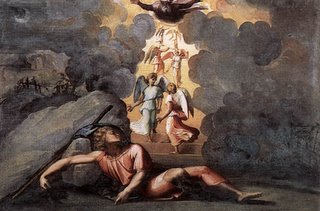 Jacob's Dream
Jacob's Dream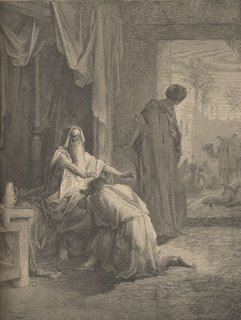 Isaac Blessing Jacob. It doesn't show up to well with the picture being this size, but notice the placement of Jacob's arms. Almost like he's "testifying."
Isaac Blessing Jacob. It doesn't show up to well with the picture being this size, but notice the placement of Jacob's arms. Almost like he's "testifying."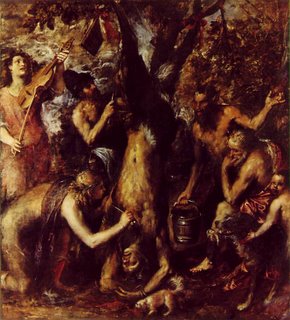 The Flaying of Marsyas by Titian. For some reason I've always really liked this painting.
The Flaying of Marsyas by Titian. For some reason I've always really liked this painting.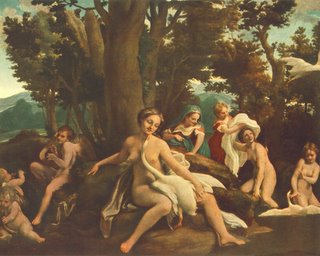 Leda and the Swan. For another artistic rendering, see my first exam.
Leda and the Swan. For another artistic rendering, see my first exam. 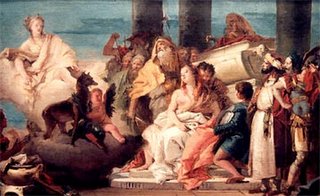 The sacrifice of Iphigenia. What we won't do for the winds.
The sacrifice of Iphigenia. What we won't do for the winds.  Another statue of Dionysus. "Wine, women and song." A classical and biblical intersection.
Another statue of Dionysus. "Wine, women and song." A classical and biblical intersection. 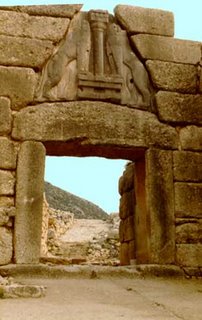 The Lion Gate. Supposedly the actual doorjamb to the house of Atreus.
The Lion Gate. Supposedly the actual doorjamb to the house of Atreus.